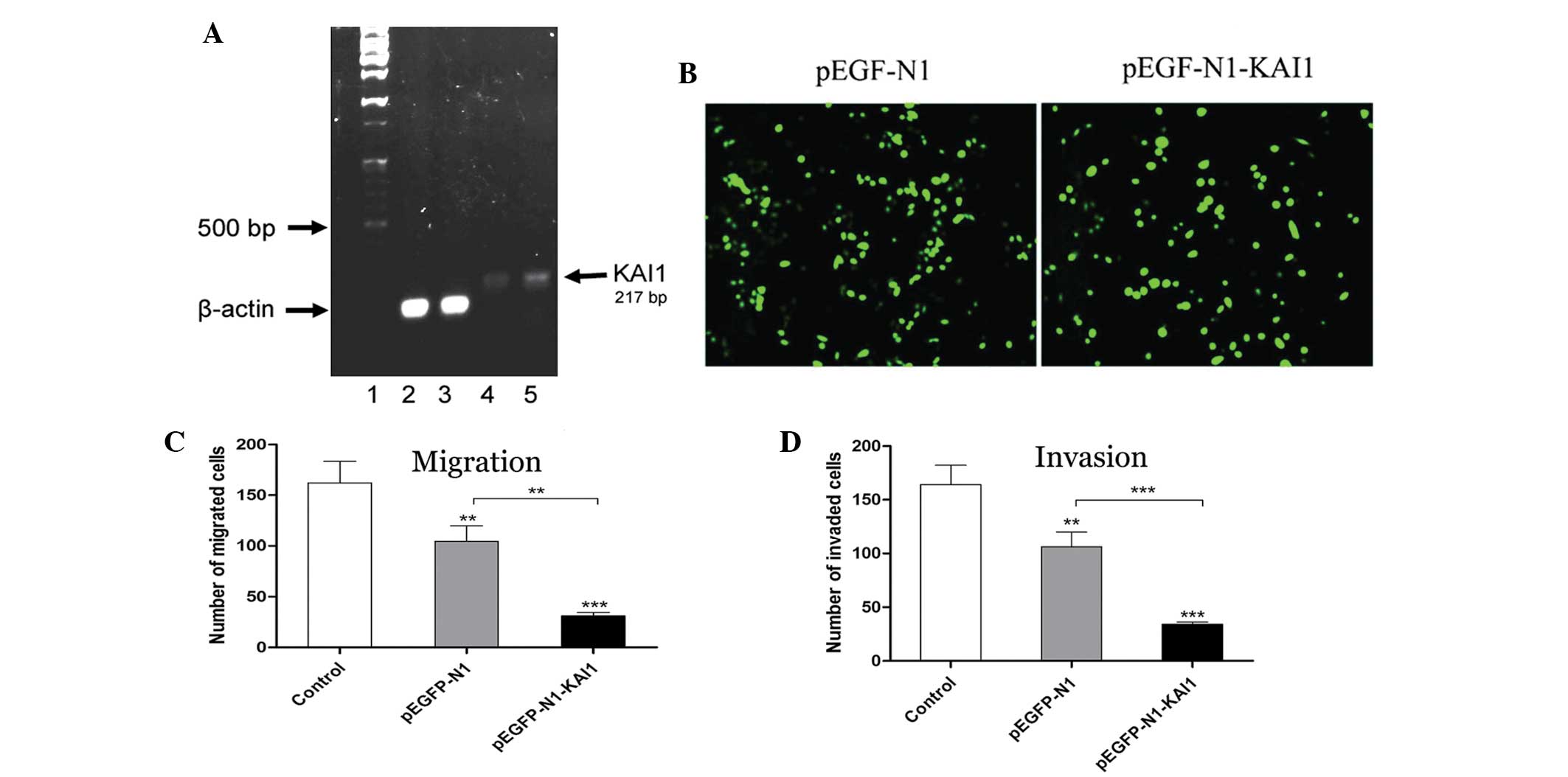|
1
|
Dong JT, Lamb PW, RinkerSchaeffer CW,
Vukanovic J, Ichikawa T, Isaacs JT and Barrett JC: KAI1, a
metastasis suppressor gene for prostate cancer on human chromosome
11p11.2. Science. 268:884–886. 1995. View Article : Google Scholar : PubMed/NCBI
|
|
2
|
Mashimo T, Watabe M, Hirota S, Hosobe S,
Miura K, Tegtmeyer PJ, RinkerShaeffer CW and Watabe K: The
expression of the KAI1 gene, a tumor metastasis suppressor, is
directly activated by p53. Proc Natl Acad Sci USA. 95:11307–11311.
1998. View Article : Google Scholar : PubMed/NCBI
|
|
3
|
Guo C, Liu QG, Zhang L, Song T and Yang X:
Expression and clinical significance of p53, JunB and KAI1/CD82 in
human hepatocellular carcinoma. Hepatobiliary Pancreat Dis Int.
8:389–396. 2009.PubMed/NCBI
|
|
4
|
Liu FS, Dong JT, Chen JT, Hsieh YT, Ho E,
Hung MJ, Lu CH and Chiou LC: KAI1 metastasis suppressor protein is
down-regulated during the progression of human endometrial cancer.
Clin Cancer Res. 9:1393–1398. 2003.PubMed/NCBI
|
|
5
|
Lee HS, Lee HK, Kim HS, Yang HK and Kim
WH: Tumour suppressor gene expression correlates with gastric
cancer prognosis. J Pathol. 200:39–46. 2003. View Article : Google Scholar : PubMed/NCBI
|
|
6
|
Lee JH, Seo YW, Park SR, Kim YJ and Kim
KK: Expression of a splice variant of KAI1, a tumor metastasis
suppressor gene, influences tumor invasion and progression. Cancer
Res. 63:7247–7255. 2003.PubMed/NCBI
|
|
7
|
Hamilton SR, Bosman FT, Boffetta P, et al:
Tumor pathological type: Carcinoma of the colon and rectumWHO
Classification of Tumours of the Digestive System. Bosman FT,
Cameiro F, Hruban RH and Theise ND: IARC Press; Lyon: pp. 134–135.
2010
|
|
8
|
Leslie HS, Mary KG and Christian W: TNM
Classification of Malignant Tumours. 7th. John Wiley & Sons;
New York, NY: pp. 78–80. 2009
|
|
9
|
World Medical Association, . World Medical
Association Declaration of Helsinki: Ethical principles for medical
research involving human subjects. JAMA. 310:2191–2194. 2013.
View Article : Google Scholar : PubMed/NCBI
|
|
10
|
Liu X, Guo XZ, Li HY, Chen J, Ren LN and
Wu CY: KAI1 inhibits lymphangiogenesis and lymphatic metastasis of
pancreatic cancer in vivo. Hepatobiliary Pancreat Dis Int.
13:87–92. 2014. View Article : Google Scholar : PubMed/NCBI
|
|
11
|
Tang Y, Cheng Y, Martinka M, Ong CJ and Li
G: Prognostic significance of KAI1/CD82 in human melanoma and its
role in cell migration and invasion through the regulation of ING4.
Carcinogenesis. 35:86–95. 2014. View Article : Google Scholar : PubMed/NCBI
|
|
12
|
Gupta GP and Massagué J: Cancer
metastasis: Building a framework. Cell. 127:679–695. 2006.
View Article : Google Scholar : PubMed/NCBI
|
|
13
|
Adachi M, Taki T, Ieki Y, Huang CL,
Higashiyama M and Miyake M: Correlation of KAI1/CD82 gene
expression with good prognosis in patients with non-small cell lung
cancer. Cancer Res. 56:1751–1755. 1996.PubMed/NCBI
|
|
14
|
Liu W, IiizumiGairani M, Okuda H,
Kobayashi A, Watabe M, Pai SK, Pandey PR, Xing F, Fukuda K and
Modur V: KAI1 gene is engaged in NDRG1 gene-mediated metastasis
suppression through the ATF3-NFkappaB complex in human prostate
cancer. J Biol Chem. 286:18949–18959. 2011. View Article : Google Scholar : PubMed/NCBI
|
|
15
|
Jee B, Jin K, Hahu JH, Song HG and Lee H:
Metastasis-suppressor KAI1/CD82 induces homotypic aggregation of
human prostate cancer cells through Src-dependent pathway. Exp Mol
Med. 35:30–37. 2003. View Article : Google Scholar : PubMed/NCBI
|
|
16
|
Zhang XA, Lane WS, Charrin S, Rubinstein E
and Liu L: EWI2/PGRL associates with the metastasis suppressor
KAI1/CD82 and inhibits the migration of prostate cancer cells.
Cancer Res. 63:2665–2674. 2003.PubMed/NCBI
|
|
17
|
Zhang XA, He B, Zhou B and Liu L:
Requirement of the p130CAS-Crk coupling for metastasis suppressor
KAI1/CD82 mediated inhibition of cell migration. J Biol Chem.
278:27319–27328. 2003. View Article : Google Scholar : PubMed/NCBI
|
|
18
|
Kauffman EC, Robinson VL, Stadler WM,
Sokoloff MH and Rinker-Schaeffer CW: Metastasis suppression the
evolving role of metastasis suppresson genes for regulating cancer
cell growth at the secondary site. J Urol. 169:1122–1133. 2003.
View Article : Google Scholar : PubMed/NCBI
|
|
19
|
Shinohara T, Mike T, Nshimura N, Nokihara
H, Hamada H, Mukaida N and Sone S: Nuclear factor-kappaB-dependent
expression of metastasis suppressor KAI1/CD82 gene in lung cancer
cell lines expressing mutant p53. Cancer Res. 61:673–678.
2001.PubMed/NCBI
|
|
20
|
Feng JG and Nan XR: The distribution and
expression of bFGF in oral squamous cell carcinoma. Chinese
Remedies & Clinics. 8:3882008.
|
|
21
|
Grove LM, Southern BD, Jin TH, White KE,
Paruchuri S, Harel E, Wei Y, Rahaman SO, Gladson CL, Ding Q, et al:
Urokinase-type plasminogen activator receptor (uPAR) ligation
induces a raft-localized integrin signaling switch that mediates
the hypermotile phenotype of fibrotic fibroblasts. J Biol Chem.
289:12791–12804. 2014. View Article : Google Scholar : PubMed/NCBI
|
|
22
|
Knoener M, Krech T, Puls F, Lehmann U,
Kreipe H and Christgen M: Limited value of KAI1/CD82 protein
expression as a prognostic marker in human gastric cancer. Dis
Markers. 32:337–342. 2012. View Article : Google Scholar : PubMed/NCBI
|
















